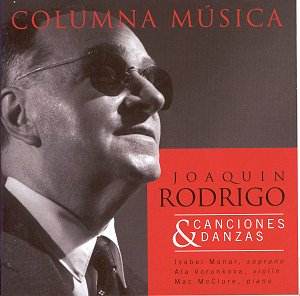


Joaquin RODRIGO (1901-1999)
Cançó del grumet for Soprano and piano [1.57] (1938)
Pastorcito santo [2.51]
Cuatro Madrigales Amatorios (1948): Con qué la lavaré [2.25];
Vos me matásteis (2.23); De dónde venís amore [1.11];
De los álamos vengo Madre [2.19]
from Cuatro Cançones Sefardíes (1965): Nani, nani [3.21];
Morena me llaman [1.04]; Adela [1.54]
from Con Antonio Machado: Canción del Duero [2.16] (1971)
Pastoral for Piano [2.39] (1926)
de Cinco Sonatas de Castilla (1951): Como un tiento [5.17]
de Album de Ceclia ('six pieces for little hands') (1948): María
de los Reyes [0.40]; A la Jota, Jota de las Palomas [1.09]; Canción
del Hada rubia [1.17]; Canción del Hada morena [0.44]; El negrito
Pepo [1.54]; Borriquillos a Belén [1.55]; Berceuse de Printemps
[2.23]
Set Cançons Valencianes for Piano and violín (1982): Allegretto
[2.51]; Andante moderato [2.20]; Allegro [1.49]; Andante moderato e molto
cantabile [3.44]; Andantino [2.36]; Andante religioso [3.16]; Tempo de
bolero [2.35]
Sonata Pimpante (1966): Allegro [7.03]; Adagio [8.12]; Allegro molto [4.09]
Isabel Monar, soprano; Ala Voronkova, violin; Mac McClure, piano
![]() Notes in Catalán,
Castellano and English. Texts and English translations (not parallel)
Notes in Catalán,
Castellano and English. Texts and English translations (not parallel)
Recorded at la Sala Paper de Musica de Capellades, Barcelona, Spain, May
2001
![]() COLUMNA MÚSICA
1CM0077 [72.54]
COLUMNA MÚSICA
1CM0077 [72.54]
Comparison recording
Cuatro Madrigales Amatorios, Louisville Orchestra, Robert Whitney, cond.;
Audrey Nossaman, soprano. Louisville First Edition LP LOU-606
BUY NOW
Crotchet AmazonUK AmazonUS